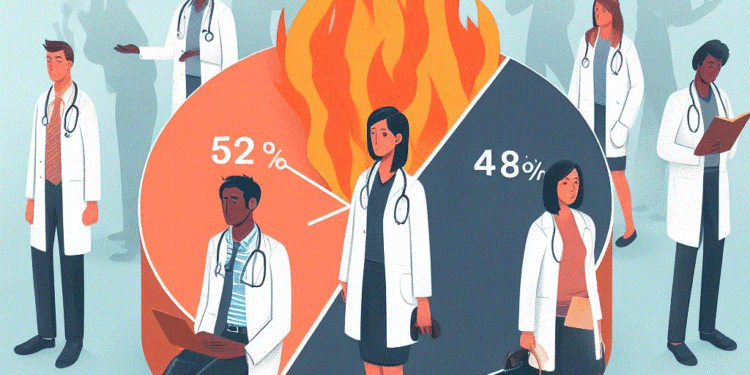
In fact the 2021 physician burnout survey was one of my first blogs after founding Physicians Anonymous. I love how they use physician quotes to bring life to the data. In 2021, the report was called “Death by 1,000 cuts”. We first summarized the 2021 Medscape physician burnout and suicide survey Headline: 42% of US physicians were burned out (post Covid).
More than half of physicians (52%) reported that they are burned out and nearly 1 in 4 reporting that they are clinically depressed. 30% said their burnout lasted for more than two years. 65% said that burnout harmed their personal relationships.
The latest US Physician Burnout & Depression Report (2023) from Medscape finds that physician burnout and depression are worsening. More than half of physicians (52%) reported that they are burned out and nearly 1 in 4 reporting that they are clinically depressed. The report, which surveyed over 9,000 physicians in the United States, also found – no surprises here – that the most common causes of burnout are bureaucratic demands (i.e. pajama time recording in the EHR at home, after work, for free!) and long hours.
Among physicians who reported burnout:
Only a sociopath could practice as an employee of a large health system and not be burned out. Anyone who cares about patients is doomed to be burned out.”
The report’s authors call for more research on the long-term effects of physician burnout and depression on patient care.
The report also suggests that medical schools and residency programs need to do more to teach physicians about stress management and burnout prevention. Physicians Anonymous has a science-based burnout prevention program for medical students and residents called the Burnout Vaccine™. Check it out, here.
The Medscape report’s authors call for a number of interventions to address the problem of physician burnout and depression, including:
In addition to the interventions listed above, there are a number of things that individual physicians can do to manage their own stress and burnout. These include:
If you are a physician who is experiencing burnout, you are not alone. 1 in 2 of us practising in the US are with you. 1 in 4 of us are depressed. Both figures have worsened over the last 2 years.
For FREE non-judgmental peer-support physician-to-physician, please check out our Anonymous Groups here.
If you are pre-burnout, burning, or burned, struggling with your mental health, substance use, impostor syndrome, bullying, career dilemmas, isolation – we’ve seen it all before and you are welcome at our groups.
If groups are not your thing, check out our Physicians Anonymous Approved Coaches & Mentors here (this is a paid service directly to the coach). Read the profiles and reach out to one of our wonderful people for an initial consultation.
If you suspect you may be suffering from a clinical condition like depression, we urge you to seek help from a qualified medical or mental health professional. Pamela Wible has some great tips on getting clinical help “off the record” if you are concerned about that.
There are also a number of resources available online and in your community to help you manage stress and burnout.
The issue of physician burnout is a complex one, and there is no easy solution. However, the 2023 Medscape Physician Burnout and Depression Report provides a valuable overview of the problem and its potential impact on patient care.
The report’s findings should serve as a call to action for policymakers, healthcare organizations, and individual physicians to take steps to address this important issue.
In the meanwhile, we are here to support you. As we grow we will seek to lobby for you. We are always looking for like minded organizations to join voices and forces with – please contact us.
